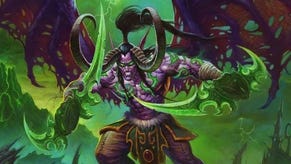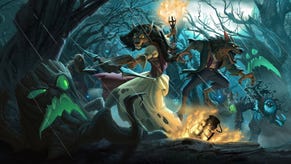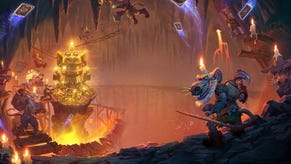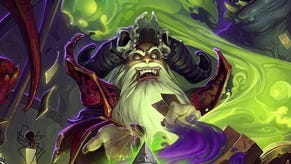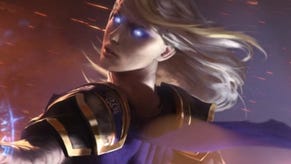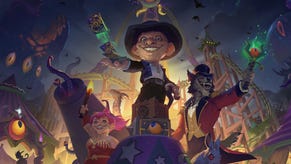Mind games: The battle of wits that unites snooker and Hearthstone
The agony and the ecstasy.
The final frames of this year's World Snooker Championship will take place later today, and a new Hearthstone meta is in full swing too. Republished from 2015, here's John Bedford's take on the curious mind games that unite the worlds of the Crucible and the tavern.
It's hard to imagine two more polarised moments in snooker's history. Back in 1997, Ronnie O'Sullivan - arguably the most talented player of all time, and alongside Jimmy White and Alex Higgins certainly one of the most popular - completes a maximum break of 147 in an unprecedented five minutes and 20 seconds.
A man so adept at the task before him that he appears almost bored by his own capabilities, O'Sullivan moves from shot to shot, sizing up each problem, divining the solution, and then executing it with almost reckless speed. He seems to almost dare himself to fail - and no one watching can quite bring themselves to believe he will.
Fast forward less than a decade, and O'Sullivan - now cutting an almost Syd Barrett-like figure with his closely shaven head and tired eyes - is playing against Peter Ebdon, a man who could charitably be called a master of the waiting game. Every angle before him is scrutinised, and every possibility is weighed, considered and checked against the rest. If O'Sullivan's a gambler, Ebdon is an accountant.
By the time the clock has ticked slowly beyond the five or so minutes it once took O'Sullivan to perform that record-breaking clearance, Ebdon has achieved a break of 12. Even worse, he finishes his turn by fumbling a red into the jaws of the pocket. As Ebdon settles into his chair - and in a rare break from snooker's gentlemanly code of conduct - Ronnie grins on behalf of the nation. As he leers at the back of Ebdon's head, I can almost hear it: "Sorry that happened..."
I've recently come to realise that, throughout my life, I've been drawn towards a certain type of game - and nothing has come to highlight this quite like my passion for Hearthstone and for snooker. The differences between the two games are transparent enough, but it's what unifies them that makes them so captivating to watch and to play.
Both, for example, demand a high degree of forward planning based on incomplete information. Those who focus rigidly on the moment don't climb very high on Hearthstone's ladder, and they certainly don't win many frames of snooker. To win, you must instead grasp the problem at hand and play with it like a toy, turning objects of mathematical pleasure this way and that, exposing them to different lights, and determining the best possible course of action before committing to it. To win, you must be able to speculate and take risks.
Beyond that, I think there's a darker truth at work too. For someone to emerge victorious from these games of pause, reflection, consideration and execution, it's often not enough to simply win. The person who loses must also throw it away to one degree or another, whether through poor execution, inexperience or greed. When your turn comes, you have all the time and space in the world to be as terrible as you're capable of being.
Crucially, O'Sullivan's 147 - entertaining though it is to watch - is an anomaly in the game of snooker, much as a perfect starting hand against an impossibly weak one can occur between two otherwise equal and exceptional Hearthstone players. These occasions are inevitable given the rules of each game, but if they happened with any kind of regularity both would quickly lose their appeal.
Instead they derive their bite from the downtime that players endure after making a mistake or an inefficient play, the downtime during which the opponent is most likely capitalising on it. It's this lonely stretch of time you're given to reflect on your shortcomings that undoes you in the long run. Your opponent is mute while you wait for your next opportunity, and yet it's easy to sense their actions betraying a host of unspoken insults that gnaw and niggle at you.
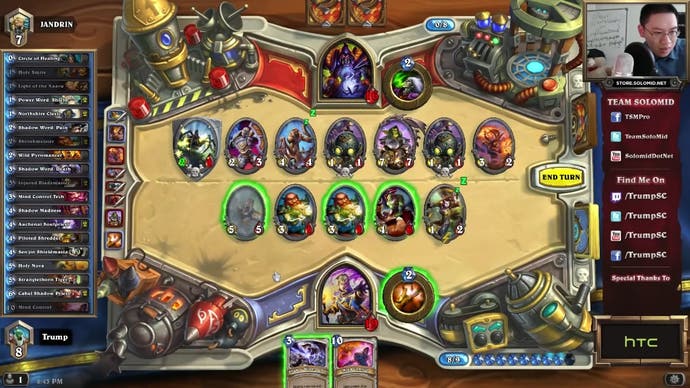
Like Ebdon they sometimes stall, not because they're slowly thinking their play through, of course, but because they want to frustrate you. They toy endlessly with the delicious fruits of your mistakes, as though finding themselves spoilt for choice. Is that really the case though, or are your own devils gently whispering your inadequacies to you through the prism of your opponent?
Either way, you must be ready to capitalise on your opponent's next mistake, and do so without missing a beat. Most psychologically damning of all is that moment when their shoulders slump and the adrenaline surges through you with mean-spirited triumph, while they head off to endure the same unbearable fate you know only too well.
This guilty, unspoken sadism isn't the exclusive preserve of the players either - the audience in both games is complicit in every drop of it too. It's not just the technical appreciation of a game well played, and the illicit enjoyment of a psychological battle that draws spectators to both games. They also get to experience this agony and this ecstasy vicariously, and with none of the personal risk. For our collective sins, we at least veer towards cheering the underdog - we know how much more they suffer.
It's remarkable that on the surface neither game betrays the true depth of these emotions, and yet the concept of tilt is a crucial component of both. In this fractured state of mind, frustration takes hold and you begin playing with your heart, rather than your head. I've experienced it myself when it seems like nothing you do is good enough to climb higher on Hearthstone's ladder, and instead of taking a break you slide ever further down the rungs.
This state of tilt changes everything. The match, the world, and everything that takes place within it becomes a source of injustice, rather than the result of a personal oversight, or someone's transitory good fortune. Left unchallenged, these thoughts feed on your irrational beliefs until you slip further and further behind with each encounter. By contrast, when you're hot - like O'Sullivan picking apart the 147 - you're not even at the controls anymore.
When you slide, you must make peace with your past incompetence if you're to have any hope of rising above it. Only the task ahead of you can be allowed to exist, and you must silence the whispers of doubt that come at you, now armed with the hard evidence of your own inadequacy. So what if you're 9-2 down in a best of 19 match anyway? All you have to do now is not lose eight times and you're home free.
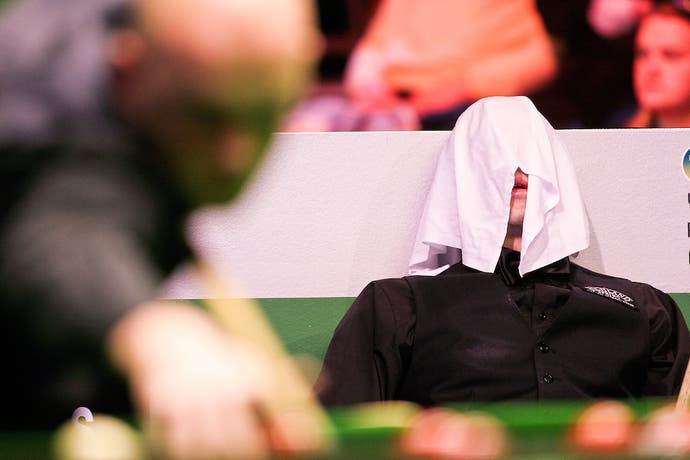
It all begs the question of why anyone would want to participate in these experiences that promise so much psychological punishment, and where supreme self-belief meets crushing self-doubt and both refuse to let go of the other. It would be crass to reduce the demons of some of snooker's most notably troubled players - White, Higgins, O' Sullivan - to a single cause, but it's at least interesting to wonder what could possibly draw such fragile personalities towards a sport that holds the potential for so much torment.
From my own perspective, these kind of games are intrinsically risky to participate in, and that's precisely what makes makes them so compelling to experience. You challenge the negative and positive beliefs about yourself in equal measures, and while it's unquestionably painful to misstep, to rise above your own failings is exquisite. You want to be better than the quiet voices of self-doubt would have you believe you are, and these games provide an arena within which to test them - with all the risk that entails.
Perhaps we simply play these games because we are the most interesting player any of us can ever hope to challenge - an opponent rich in belief, desire, pride, potential, competitiveness, and - ultimately - a capacity for failure despite all of these things. Hearthstone streamer Jeffrey "Trump" Shih once touched on this in a moment of insight so perfectly profound in its simplicity that he deserves the final word on the subject.
"You have an opponent," he says. "But really it's a game against yourself."




